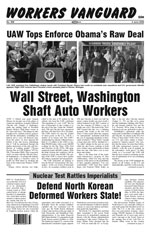
Tiananmen 1989: Incipient Proletarian Political Revolution June 4 marks the 20th anniversary of the Chinese government’s bloody suppression of mass protests centered on Beijing’s Tiananmen Square. The imperialists and their media mouthpieces have seized on the anniversary to falsely portray those protests as a movement favoring capitalist counterrevolution under the banner of Western-style “democracy.” In the two excerpts printed below, taken from articles published in Workers Vanguard before and after the Tiananmen massacre, we underscored that the mass upheaval—which began with students but increasingly drew in workers chafing under the impact of pro-capitalist “market reforms”—heralded the beginning of a proletarian political revolution against the Stalinist rulers of the Chinese bureaucratically deformed workers state. * * * The imperialists would like to see in the Beijing spring the flowering of a pro-Western mass movement. Some of the students’ appeals are clearly aimed at the American media, such as the banner proclaiming (in English) “Give Me Liberty or Give Me Death.” But as an April 27 march of 150,000 students attracted the support of an even larger number of workers, the marchers responded by chanting “Long live the proletariat!” And over and over they sing the Internationale, the historic anthem of the socialist working class. Again on the weekend of May 20-21, as the regime headed by Deng Xiaoping and Prime Minister Li Peng ordered troops to remove student hunger strikers, workers streamed into the square to stand with them. But while the workers have been massively present in the protests, they have not yet mobilized behind their own class program—to oust the bureaucratic misleaders of the Chinese deformed workers state and establish the rule of proletarian soviets…. Most dramatic is the immobilization of the army. Li Peng’s order for a military crackdown was essentially ignored. Not only were the units which ventured into the capital surrounded by the populace, subway workers and management refused to transport them underground. The 38th Army, which is based in Beijing and includes many draftees from the capital, reportedly refused to move on the crowds. (The commander’s daughter is supposed to be among the hunger strikers.) Now a letter has surfaced from seven former high-ranking military leaders, and signed by more than 100 officers, opposing bringing troops into the capital: “The army absolutely must not shoot the people” (New York Times, 23 May). The Paris Libération (18 May) quotes a former officer saying, “the situation in China currently rather resembles Hungary in 1956, except there is no possible Soviet intervention to save the regime.” In the face of this explosion of mass discontent, Deng called for “tough tactics,” to “spill blood” if necessary to stop the protests; Gorbachev warned against “hotheads.” While Bush and other Western leaders worry in public about “stability” in Beijing, privately they talk of counterrevolution. But it’s far from clear that the inchoate mass upsurge is going in any such direction. What the Chinese working people urgently need is genuine communism, a genuinely Marxist and Leninist communist party to replace the bureaucratic regime with workers and soldiers soviets at the head of the poor peasantry. Instead of the nationalism of the Chinese Stalinists from Mao to Deng, which has led China into a counterrevolutionary military and diplomatic alliance with the U.S. against the Soviet Union and Vietnam, what’s needed is communist unity against imperialism. —“Upheaval in China” (WV No. 478, 26 May 1989) * * * The June 4 massacre at Beijing’s Tiananmen Square brought China to the brink of civil war. The mass outpouring of defiance heralded the Chinese proletarian political revolution against the corrupt and despised Stalinist bureaucracy. For the moment the Deng regime has weathered the storm and is now cracking down, striking first and hardest at the working class. But the decrepit bureaucratic caste, which has opened the doors of China to massive capitalist encroachment and shamelessly allied itself with U.S. imperialism, can be shattered. The central lesson of the Beijing spring and the urgent task which stands before the Chinese workers is the forging of an authentic communist party, an internationalist vanguard…. The Western media usually describes the oppositional forces in China as “the student movement for democracy.” But it was the beginnings of a working-class revolt against Deng’s program of “building socialism with capitalist methods” which gave the protests their mass and potentially revolutionary nature. Organized workers’ contingents started to participate in the marches, and it was the threat of a general strike which led Li Peng to order martial law in mid-May. Moreover, the outpouring of hundreds of thousands of working people into the streets stymied the regime’s attempted crackdown then. When the troops attacked unarmed people in Beijing on June 4, thousands of workers battled them with whatever came to hand…. The present repression may restore a certain surface stability to China for awhile. The working class has been forced back but has by no means been crushed. The unemployment, inflation and gross inequality spawned by Deng’s “reforms” will continue to fuel popular discontent…. The only road forward remains the proletarian political revolution to oust the Stalinist bureaucracy, combined with socialist revolution against capitalist rule—not least in Hong Kong, Taiwan and strategic Japan. For Lenin’s Communism! For a Chinese Trotskyist Party, section of a reforged Fourth International! —“Defend Chinese Workers!” (WV No. 480, 23 June 1989)
|
|
||||||||||||||||||||||||||||||||||||||||||||||||||||||
